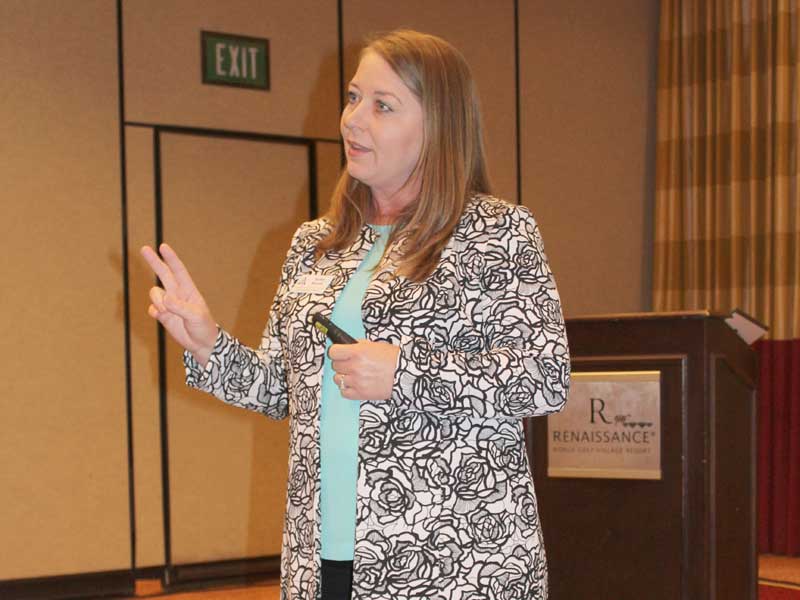by TIM CRAIG
From her office, Keitha Bennett gets one of best glimpses at the growth and future of Florida agriculture.
As coordinator of the Agricultural Education Services and Technology (AEST) certification program, the Haines City native sits at the nexus of education and industry and is able to help shape both. Yet, her perspective on the unique power of the AEST certification came while she was still an agriculture teacher at Kathleen High School.
She had watched one of her students struggle through personal and academic issues and was ready to drop out of school about two months before graduation. “He was really struggling with a lot of different things,” she says. “We were able to help him through it, he was able to get his AEST certification and he stayed in school and graduated.”
Bennett heard that the student got a position with the city parks and recreation department and when he told his supervisor of his certification, he was promoted to a lead position within his area.
“His whole confidence level has changed,” she says. “These certifications help give students the confidence to showcase their knowledge. Sometimes, it is exactly what they need.”
For Bennett, her journey to her current post took her away from where she thought she wanted to go, and put her in a place she was needed. After graduating from Haines City High School, Bennett attended the University of Florida, where she received her bachelor’s degree in Plant Science and a master’s degree in Agriculture Education and Communication. She says she wanted to work in the citrus industry, but when she couldn’t find a position, started teaching instead.
It turned out to be the right move. She spent the next 18 years teaching agriculture at three different schools in Polk County before leaving to start her current job within the Florida Farm Bureau as coordinator of AEST.
“I enjoyed the teaching experience,” she says. “I probably wouldn’t have left teaching if this position hadn’t opened up.”
Her teaching experience has come in handy. She does many of the same things, yet is able to make a difference on a statewide level, not just at one school.
The genesis of the certification program started in 2009 in the Employ Florida Banner Center. In 2011, the AEST formed as a subsidiary of the Florida Farm Bureau. “It was an effort to determine the areas of need within the agriculture industry and a way to develop skilled, entry-level labor with the proper certification to meet that need,” Bennett says.
The certification program prepares students and employees for both careers and advancement in agricultural disciplines. The program initially offered a general knowledge certification in Ag Tech. As the program evolved, the industry felt a strong need to be more specialized certifications, and the AEST responded.
“We met with some of the people in the industry and were able to ask, ‘What do you need? What is going to make for better employees?” Bennett says. “By tailoring certification to industry needs, we are creating better pools of potential job candidates.”
Now, the AEST program offers two levels — associate and specialist. For the associate level, the student demonstrates a basic knowledge of broad areas of agriculture. In the specialist level, the student demonstrates a skill level in one of eight specialized agricultural fields, including: biotechnology, communications, mechanics, agri-technology, animal science, forestry and unmanned aircraft systems (UAS). In 2018-19 two new certification offerings will be available: Associate of Agriculture Systems and Natural Resources Specialist. Since 2011 AEST has issued over 13,000 industry certifications.
For Bennett, it isn’t just the ability to respond to industry needs that makes her role exciting, it’s also the ability of the educational system to help the industry specifically define the skills they are looking for, and developing ways to test and hone those skills.
“The certification process helps connect the industry to students,” says Bennett. “Students know they like their agriculture class, they like being a part of FFA, but when it comes to a career, they never considered it because they didn’t know it could be a career.”
The exam has been approved by the Florida Department of Education and is available to middle and high school students. Other states have taken notice of the success of the program. Bennett has been consulting on a similar program in Louisiana.
While the program continues to evolve within the state and influence programs in surrounding states, for Bennett it comes back to the difference it is making in the industry and in the lives of the students.
“This is definitely making a difference in young people. I think the program is amazing, if it weren’t I would not have left the classroom,” she says. “I get to meet all kinds of students from across the state and introduce them to people who are looking to hire someone with the skills that specific student has.”

